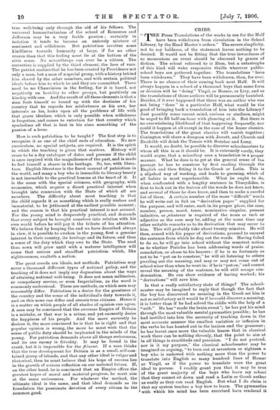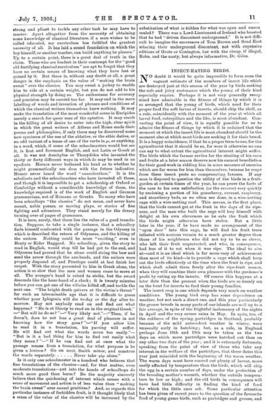CRIBS.
HE Prose Translations of the works in use for the Half have been withdrawn from circulation in the School Library, by the Head Master's orders." The severe simplicity, not to say baldness, of the statement leaves nothing to be desired. It would not be fitting that the true inwardness of so momentous an event should be obscured by graces of diction. The school referred to is Eton, but a catastrophe of this kind will wake responsive thrills wherever public. school boys are gathered together. The translations "have been withdrawn." They have been withdrawn, then, for ever. There is no chance of their coming back next Half. It will always happen in a school of a thousand boys that some form or division will be " doing " Virgil, or Homer, or Livy, and so the translations of those authors will be permanently banished. Besides, if it ever happened that there was an author who was not being 'done" in a particular Half, what would be the good of bringing back a translation of him into the Library? Just possibly some vacant mind, curious or studious, might be urged to fill half-an-hour with glancing at it. But there is no overwhelming likelihood of that happening frequently, nor could it happen at all except in the case of the lesser classics. The translations of the great classics will vanish together; Conington will share a dungeon with Jowett, and Church and Brodribb will drink the Tanais with Butcher and Lang.
It would, no doubt, be possible to discover schoolmasters to whom all this is as it should be. It is extremely rarely, they would argue, that a schoolboy uses a translation in a proper manner. What he does is to get at the general sense of the passage he has to construe by first reading through the English and then fitting it to the Greek or Latin. This is a slipshod way of working, and leads to guessing, which of all habits is most reprehensible. • What he ought to do, when confronted with a lengthy sentence in Thucydides, is first to look out in the lexicon all the words he does not know, and several of those he does know, and then to umke a careful list of them. A certain number of the more "difficult" words he will write out in full on "derivation paper" supplied for the purpose, and will enter, each in its proper place, the case, number, person, mood, tense, nominative singular, present infinitive, or ,whatever is required of the noun or verb or adjective as the case may be, adding at the same time any other suitable remarks as to its derivation that may occur to him. This will probably take about twenty minutes. He will then, armed with his paper of derivations, proceed to unravel the sentence from which he dug out the words. Having failed to do so, he will go into school without the remotest notion as to whether Pericles has been addressing words of praise, consolation, or abuse to his hearers : if he is so fortunate as not to be "put on to construe," he will sit listening to others puzzling out the meaning, and may or may not come out of school wiser than when he went in: if he is "put on," and cannot reveal the meaning of the sentence, he will still escape con- demnation. He can show evidence of having worked; his " derivations" will save him.
Is that a really satisfactory state of things? The school-
master may be imagined to reply that though the fact that the boy has discovered no meaning in the Greek set him is not so satisfactory as it would be if he could discover a meaning, it is better than if he bad solved the riddle with the help of a "crib." He has "made the brain sweat "; he has put his mind through the most valuable mental gymnastics possible; he has had instilled into him the necessity of tracking down in the most accurate manner the smallest variation or inflexion in the verbs he has hunted out in the lexicon and the grammar ; he has learnt once more the valuable lesson that in classical
work there can be nothing slovenly, that the point to aim at in all things is exactitude and precision. "I do not pretend, nor is it my purpose," the classical schoolmaster may be imagined as arguing, "to turn out at seventeen or eighteen a boy who is endowed with nothing more than the power to translate into English so many hundred lines of Homer or Virgil, as if the power to translate were the great ideal to pursue. I readily grant you that it may be true of the great majority of the boys who leave my school that they cannot sit down and read a Latin or Greek author as easily as they can read English. But what I do claim is that my system teaches a boy how to learn. The gymnastics with which his mind has been exercised have rendered it
strong and pliant to tackle any other task he may have to master. Apart altogether from the necessity of obtaining some knowledge of classical literature, if a man wishes to be called educated, my curriculum has fulfilled the greatest necessity of all. It bay laid a sound foundation on which the boy himself, or another teacher, can build anything he pleases." Up to a certain point, there is a great deal of truth in the claim, Those who are loudest in their contempt for the "good old fortifying classical curriculum" are apt to forget that they have no certain means of knowing what they have lost or gained by it. But there is, without any doubt at all, a great danger in the emphasis on the value of "making the brain sweat"- over the classics. You may sweat a jockey to enable him to ride at a certain weight, but you do not add to his physical strength by doing so. The enthusiasm for accuracy and precision may be carried too far. It may end in the mere labelling of words and invention of phrases and conditions of which the classical writers themselves knew nothing. It may make the translation of the most wonderful acenein Euripides merely a search for queer uses of the optative. It may result in the killing of all desire to enter into the high, clear spirit in which the great writers of Athens and Rome made their poems and philosophies, if only there may be discovered some new specimen of the use of the ablative, or the ethic dative, or an odd variant of a tense of one of the verbs in Ft , or anything, in a word, which, if some of the schoolmasters would but see it, is first and foremost English; and not Latin or Greek at all. It was not Aeschylus or Thucydides who invented the thirty or forty different ways in which .11, may be used in an apodosis. Horace never bothered his head as to whether he might grammatically use dun with the future indicative. Homer never heard the word " anacoleuthon." It is the scholiasts and the schoolmasters who have invented all those, and though it is impossible to get a scholarship at Oxford or Cambridge without a considerable knowledge, of them, the knowledge required is of the work of English and German grammarians, not of Romans or Greeks. To many who have been schoolboys "the classics" do not mean, and never have meant, noble poems, or moving plays, or stories of fine fighting and adventure. They stand merely for the dreary turning over of pages of grammars.
It is here, surely, that there lies the value of a good transla- tion. Suppose, to take a single instance, that a schoolboy finds himself confronted with the passage in the Odyssey in which is described the return of Odysseus, and the killing of the suitors. Nothing could be more "exciting," even in Henty or Rider Haggard. No schoolboy, given the story to read in English, would stop till he had got to the end, and Odysseus had proved that he alone could string the bow and send the arrow through the axe-heads, and the suitors were properly disposed of, and Penelope could at last finish her carpet. With the story presented to him in Greek alone, the action is so slow that the men and women cease to move at all. The avenger's hand is raised to strike, but the sword descends like the hour-hand of a clock ; it is twenty minutes before you can get one of the villains killed off, and tackle the next one. "The bright death quivers at the victim's throat" for such an interminable age that it is difficult to guess whether poor Iphigenia will die to-day or the day after to- morrow. May not anybody read on and find out what happens ? "He is at liberty to read on in the original Greek." —"But will he do so? "—" Very likely not."—" Then, if he doesn't, does he not lose a great deal of pleasure in not knowing how the story goes ? "—"If you allow him to read it in a translation, his parsing will suffer. He will find out what the words mean too easily."— " But is it a bad thing for him to find out easily what they mean "—" If he can find out at once what the passage means from a translation, for what purpose is he given a lexicon ? Go on next, Smith minor, and construe the words separately Never take yap alone."
Is it only one schoolmaster in a hundred who believes that fine translations of the classics—and, for that matter, even moderate translations—put into the hands of schoolboys do much more good than harm ? Do the majority sincerely believe that the quickening of interest which comes with a sense of movement and action is of less value than "making the brain sweat" over causal genitives? And, as regards this particular instance of forbidden fruit, is it thought likely that a sense of the value of the classics will be increased by the
substitution of what is bidden for what was open and uncon cealed ? There was a Lord-Lieutenant of Ireland who boasted that he had "driven discontent underground." It is not diffi- cult to imagine the successors of Tom Brown and Scud East solacing their underground discontent, not with expensive editions of Grote or Conington, but with the cheap, if illegal, Bohn, and the nasty, but always informative, Dr. Giles.



















































 Previous page
Previous page